高中英语情态动词的常用用法归纳(超详细)
(完整版)情态动词详细用法归纳
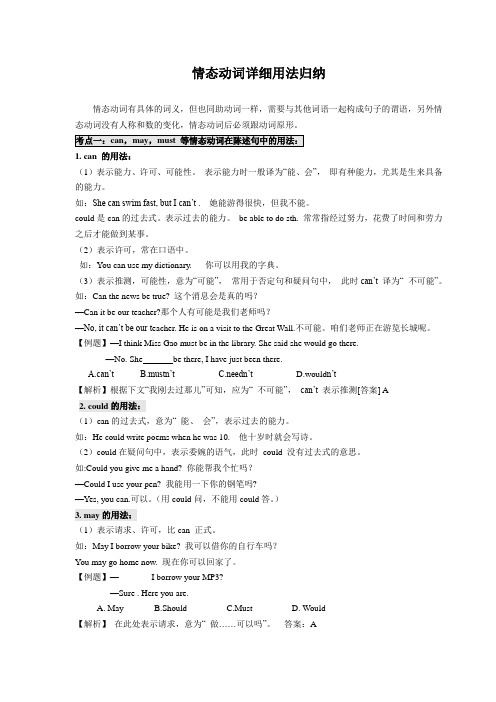
情态动词详细用法归纳情态动词有具体的词义,但也同助动词一样,需要与其他词语一起构成句子的谓语,另外情态动词没有人称和数的变化,情态动词后必须跟动词原形。
1. can 的用法:(1)表示能力、许可、可能性。
表示能力时一般译为“能、会”,即有种能力,尤其是生来具备的能力。
如:She can swim fast, but I can’t . 她能游得很快,但我不能。
could是can的过去式。
表示过去的能力。
be able to do sth. 常常指经过努力,花费了时间和劳力之后才能做到某事。
(2)表示许可,常在口语中。
如:You can use my dictionary. 你可以用我的字典。
(3)表示推测,可能性,意为“可能”,常用于否定句和疑问句中,此时can’t 译为“ 不可能”。
如:Can the news be true? 这个消息会是真的吗?—Can it be our teacher?那个人有可能是我们老师吗?—No, it can’t be our t eacher. He is on a visit to the Great Wall.不可能。
咱们老师正在游览长城呢。
【例题】—I think Miss Gao must be in the library. She said she would go there.—No. She be there, I have just been there.A.can’tB.mustn’tC.needn’tD.would n’t【解析】根据下文“我刚去过那儿”可知,应为“ 不可能”,can’t 表示推测[答案] A2. could的用法:(1)can的过去式,意为“ 能、会”,表示过去的能力。
如:He could write poems when he was 10. 他十岁时就会写诗。
(2)could在疑问句中,表示委婉的语气,此时could 没有过去式的意思。
(完整版)情态动词用法归纳

情态动词用法归纳情态动词有can (could), may (might), must, have to, shall (should, will (would), dare (dared), need (needed), ought to等. 情态动词无人称和数的变化;不能单独使用,必须与其后的动词原形构成谓语一、 can, could1) can, could表示能力(体力、知识、技能). Can you lift this heavy box?(体力)Mary can speak three languages。
(知识) Can you skate?(技能)此时可用be able to代替.用be able to改写上面三个句子。
Can只有一般现在时(can)和一般过去式(could);而be able to则有更多的时态。
am/is/are able to(一般现在时):I am able to do this job,其它几个自己改写was/were able to(一般过去式): He was able to do this jobwill be able to(一般将来时):I will(won't) be able to do this job this afternoonI'll not be able to come this afternoon.当表示“经过努力才得以做成功某事”时应用be able to,不能用Can.如:He can’t swim,but he is able to cross the river.2) can, could表示请求和允许。
—-———Can I go now? =May I go now?——-—- Yes, you can。
/ No,you can’t.=Yes,you may。
/No,you may not.此时可与may互换。
高考英语情态动词语法知识点与用法
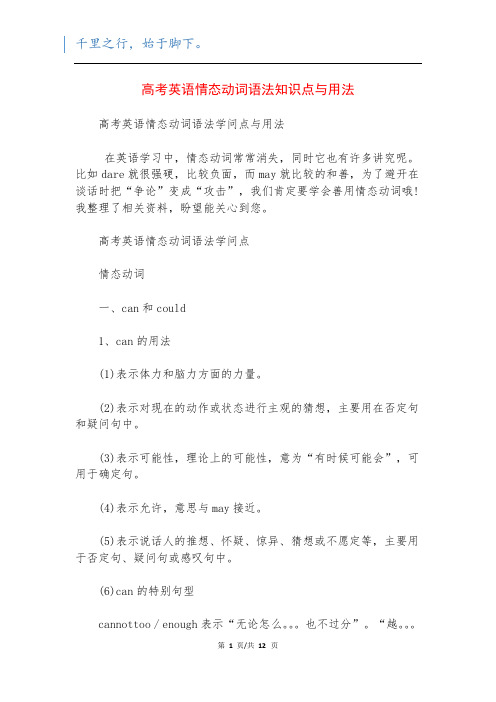
高考英语情态动词语法知识点与用法高考英语情态动词语法学问点与用法在英语学习中,情态动词常常消失,同时它也有许多讲究呢。
比如dare就很强硬,比较负面,而may就比较的和善,为了避开在谈话时把“争论”变成“攻击”,我们肯定要学会善用情态动词哦!我整理了相关资料,盼望能关心到您。
高考英语情态动词语法学问点情态动词一、can和could1、can的用法(1)表示体力和脑力方面的力量。
(2)表示对现在的动作或状态进行主观的猜想,主要用在否定句和疑问句中。
(3)表示可能性,理论上的可能性,意为“有时候可能会”,可用于确定句。
(4)表示允许,意思与may接近。
(5)表示说话人的推想、怀疑、惊异、猜想或不愿定等,主要用于否定句、疑问句或感叹句中。
(6)can的特别句型cannottoo / enough表示“无论怎么。
也不过分”。
“越。
越好”。
cannot but+ do sth.表示“不得不,只好”。
2、could的用法(1)表示力量,指的是过去时间。
(2)表示允许,指的是过去时间。
(3)表示可能,可以指过去时间,也可以指现在时间,表示语气缓和。
(4)委婉客气地提出问题或陈述看法,指的是现在时间。
主要用于疑问句,回答时用can。
3、can与could的区分can表推想时只用于否定句和疑问句(could无此限制)。
couldnt 的可能性比cant小。
4、can与be able to的区分(1)现在时:无区分,但后者不常用。
(2)完成时;can没有完成时,此时要用have(has,had)been able to。
(3)将来时:can没有将来时,要用will be able to。
(4)过去时:could表示一般力量,was/were able to 表示在详细场合通过努力胜利做成某事的力量。
二、may 和might1、may的用法(1)表示询问或说明一件事可不行以做。
(2)表示一件事或许会发生或某种状况可能会存在,通常用在确定句和否定句中。
情态动词主要用法总结

情态动词主要用法总结情态动词是用来表示说话人的态度、情感或意愿的动词。
情态动词有can、could、may、might、shall、should、will、would、must、need 等。
以下是情态动词的主要用法总结:1.表示能力:- Can:表示一般的能力或技能,意为“能够”。
- Could:表示过去的能力或技能,意为“能够”。
2.表示许可或允许:- Can:表示一般的许可或允许,意为“可以”。
- May:表示正式的或礼貌的许可,意为“可以”。
3.表示可能性:- May:表示可能性较大,意为“可能”。
- Might:表示可能性较小,意为“可能”。
4.表示意愿或请求:- Shall:用于第一人称中,表示提议、请求或建议,意为“将”。
- Should:用于第一人称或第三人称中,表示忠告、建议或期望,意为“应该”。
- Will:用于第一人称和第三人称中,表示意愿、决心或承诺,意为“将”。
- Would:用于第一人称和第三人称中,表示客气的请求、建议或愿望,意为“将”。
5.表示必要性或推测:- Must:表示必须性或应该性,意为“必须”。
- Should:表示推测、猜测或可能性较大的必要性,意为“应该”。
6.表示时间或条件:- Will/Would:表示未来时间或条件,意为“将/将会”。
7.表示推测或假设:- Must:表示肯定的推测,意为“一定”。
- May/Might:表示可能的推测,意为“可能”。
需要注意的是,情态动词本身没有人称和数的变化,后面的动词应为原形。
另外,他们常常与动词的原形连用构成谓语,可以用于各种句型,例如肯定句、否定句、疑问句等。
14个情态动词及其用法

14个情态动词及其用法14个情态动词及其用法如下:1.can:表示能力,用于疑问句或否定句中表示惊异、怀疑、不相信等态度。
如:Can you speak English?你会说英语吗?2.could:表示过去的能力或可能性。
表示惊异、怀疑、不相信等态度时,可用could。
如:Could you have done this?你真的能做到这个吗?3.may:表示可能性。
用于请求、允许、祝愿等场合。
如:May I borr ow your book?我能借你的书吗?4.might:表示可能性,比may更委婉。
如:Might I have your attenti on,请大家注意。
5.must:表示肯定、确定,用于陈述事实或推测。
如:The game must be over,比赛应该结束了。
6.need:表示需要、必要性。
如:We need to finish this task today。
我们今天需要完成这个任务。
7.ought to:表示应该、应当,用于表示道义上的责任或推测。
如:Yo u ought to help him,你应当帮助他。
8.dare:表示勇气、敢。
如:Dare you jump off the bridge?你敢从桥上跳下去吗?9.shall:表示询问、承诺、威胁等。
如:Shall we start?我们开始吗?10.will:表示将来、意愿、决心等。
如:I will finish this work on ti me.我会按时完成这个工作。
11.had better:表示建议、警告。
如:You had better hurry,你最好快点。
12.have to:表示被迫、必须。
如:I have to go to work,我必须去上班。
ed to:表示过去经常发生的动作或状态,也可表示习惯或倾向。
如:He used to smoke,他过去经常抽烟。
14.shouldn't:表示不应该,用于否定句中表示建议、批评等。
高三情态动词的用法归纳

高中情态动词的用法考点归纳一.can和could(1)could用来表示请求时,语气委婉,主要用于疑问句,不能用于肯定句,答语应用can(即:could不能用于现在时态的简略答语中)。
如:——Could I use your dictionary?•——Y es, you can.(否定回答可用:No, I’m afraid not.)回答由could引起的问句,仍用can 而不用could。
-Could you wait a few more minutes?-Y es, I can(2)can和be able to辨析can(could)和be able to都可以表示能力,意思上没有区别。
但can只有现在式和过去式,而be able to则有更多的形式。
如:I’ve always wanted to able to speak fluent English.Those bags look really heavy, are you sure you’ll be able to carry them on your own?但是,表示在过去某时的某一场合经过一番努力,终于做成了某事,通常不用could,而用was/were able to来表示。
这时,was/were able to相当于managed to do或succeed in doing。
如:After the accident it was a long time before she was able to walk again.The fire was very big, but most people were able to escape from the building.(3) 惯用形式“cannot …too…”表示“无论怎么……也不(过分)”。
如:Y ou cannot be too careful.你越小心越好。
情态动词的用法完整详细
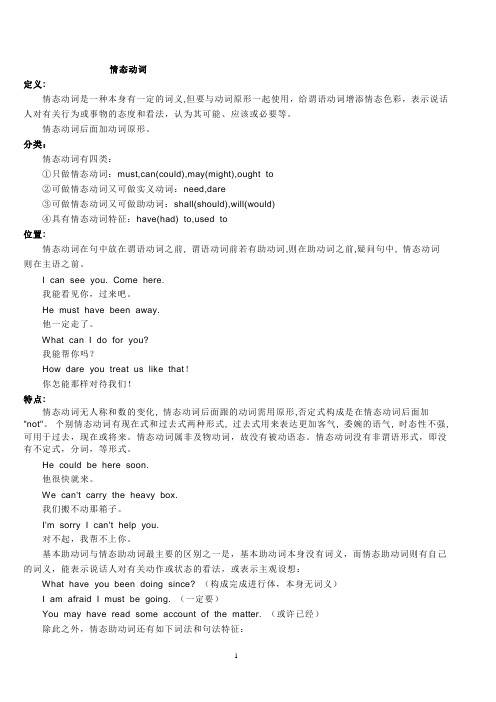
情态动词定义:情态动词是一种本身有一定的词义,但要与动词原形一起使用,给谓语动词增添情态色彩,表示说话人对有关行为或事物的态度和看法,认为其可能、应该或必要等。
情态动词后面加动词原形。
分类:情态动词有四类:①只做情态动词:must,can(could),may(might),ought to②可做情态动词又可做实义动词:need,dare③可做情态动词又可做助动词:shall(should),will(would)④具有情态动词特征:have(had) to,used to位置:情态动词在句中放在谓语动词之前, 谓语动词前若有助动词,则在助动词之前,疑问句中, 情态动词则在主语之前。
I can see you. Come here.我能看见你,过来吧。
He must have been away.他一定走了。
What can I do for you?我能帮你吗?How dare you treat us like that!你怎能那样对待我们!特点:情态动词无人称和数的变化, 情态动词后面跟的动词需用原形,否定式构成是在情态动词后面加"not"。
个别情态动词有现在式和过去式两种形式, 过去式用来表达更加客气, 委婉的语气, 时态性不强, 可用于过去,现在或将来。
情态动词属非及物动词,故没有被动语态。
情态动词没有非谓语形式,即没有不定式,分词,等形式。
He could be here soon.他很快就来。
We can't carry the heavy box.我们搬不动那箱子。
I'm sorry I can't help you.对不起,我帮不上你。
基本助动词与情态助动词最主要的区别之一是,基本助动词本身没有词义,而情态助动词则有自己的词义,能表示说话人对有关动作或状态的看法,或表示主观设想:What have you been doing since? (构成完成进行体,本身无词义)I am afraid I must be going. (一定要)You may have read some account of the matter. (或许已经)除此之外,情态助动词还有如下词法和句法特征:1)除ought和used以外,其他情态动词后面只能接不带to的不定式。
情态动词用法归纳总结
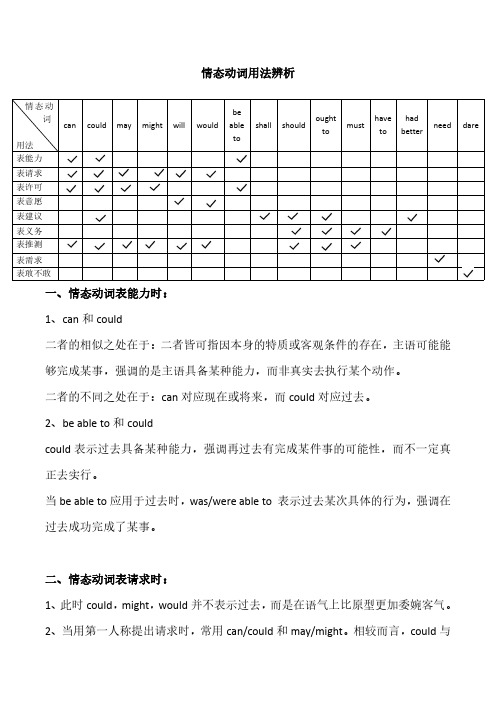
情态动词用法辨析情态动词用法can could may might will would be able to shall should ought to must have to had better need dare表能力表请求表许可表意愿表建议表义务表推测表需求表敢不敢一、情态动词表能力时:1、can 和could二者的相似之处在于:二者皆可指因本身的特质或客观条件的存在,主语可能能够完成某事,强调的是主语具备某种能力,而非真实去执行某个动作。
二者的不同之处在于:can 对应现在或将来,而could 对应过去。
2、be able to 和couldcould 表示过去具备某种能力,强调再过去有完成某件事的可能性,而不一定真正去实行。
当be able to 应用于过去时,was/were able to 表示过去某次具体的行为,强调在过去成功完成了某事。
二、情态动词表请求时:1、此时could ,might ,would 并不表示过去,而是在语气上比原型更加委婉客气。
2、当用第一人称提出请求时,常用can/could 和may/might 。
相较而言,could 与may在表请求的问句中出现的频率最高;might表发请求的语气最为委婉客气,因此反而很少见;而can则常用于熟人间的对话中。
语气强度:can>could/might>might3、当用第二人称提出请求时,常用can/could和will/would。
其中could和would 表达请求的语气更委婉客气;而can与will则常用于熟人对话中。
语气强度:can/will>could/would三、情态动词表许可时:1、与表请求不同,will/would不论前接第几人称,都表示主语本身的意愿,无需得到他人的“许可”,所以will/would不可以用于表请求的句中。
2、can和may二者都可以表示对现在或将来动作的许可,其中can的使用频率更高。
高中英语知识点归纳语法情态动词的运用

高中英语知识点归纳语法情态动词的运用高中英语知识点归纳:语法情态动词的运用高中英语中,语法知识点千变万化,其中一个重要的部分就是情态动词的运用。
掌握了情态动词的用法,可以帮助我们更准确地表达自己的意思,提升英语写作和口语表达能力。
本文将对高中英语中常见的情态动词进行归纳总结,并分别从推测、建议、允许、请求和义务五个方面进行讲解。
一、推测(speculation)1. must"must"表示推测时,常用于对现在情况进行推理,表示事物发生的可能性很大。
例如:He must be at home. (他肯定在家。
)2. might"might"是"may"的过去时态形式,表示推测时,表示事物发生的可能性较小。
例如:He might be at home. (他可能在家。
)3. could"could"表示推测时,表示事物发生的可能性较小。
例如:He could be at home. (他可能在家。
)4. can't"can't"表示推测时,表示肯定事物不可能发生。
例如:He can't be at home. (他不可能在家。
)二、建议(suggestions)1. should"should"常用于表示建议,用于表达应该或者应当发生的事情。
例如:You should go to bed early. (你应该早点睡觉。
)2. could"could"也可用于表示建议,表示某事情是可能发生的。
例如:You could try to study harder. (你可以努力学习。
)三、允许(permissions)1. can"can"表达某事物有权利、能力或许可做某事。
例如:You can go out to play. (你可以出去玩。
高考英语情态动词语法知识点与用法
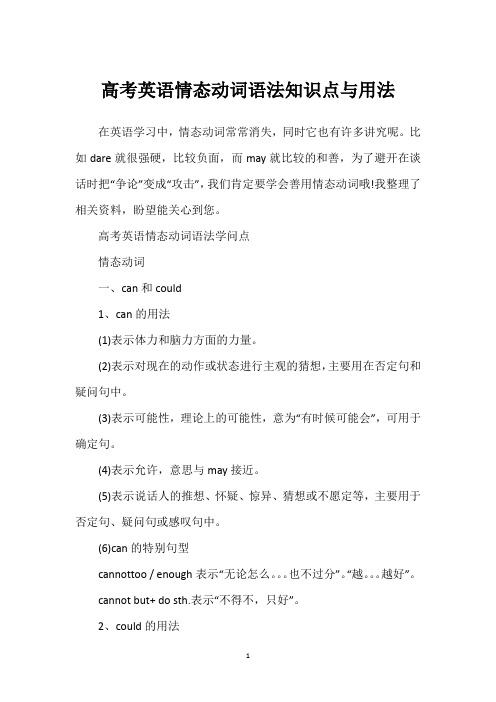
高考英语情态动词语法知识点与用法在英语学习中,情态动词常常消失,同时它也有许多讲究呢。
比如dare就很强硬,比较负面,而may就比较的和善,为了避开在谈话时把“争论”变成“攻击”,我们肯定要学会善用情态动词哦!我整理了相关资料,盼望能关心到您。
高考英语情态动词语法学问点情态动词一、can和could1、can的用法(1)表示体力和脑力方面的力量。
(2)表示对现在的动作或状态进行主观的猜想,主要用在否定句和疑问句中。
(3)表示可能性,理论上的可能性,意为“有时候可能会”,可用于确定句。
(4)表示允许,意思与may接近。
(5)表示说话人的推想、怀疑、惊异、猜想或不愿定等,主要用于否定句、疑问句或感叹句中。
(6)can的特别句型cannottoo / enough表示“无论怎么。
也不过分”。
“越。
越好”。
cannot but+ do sth.表示“不得不,只好”。
2、could的用法(1)表示力量,指的是过去时间。
(2)表示允许,指的是过去时间。
(3)表示可能,可以指过去时间,也可以指现在时间,表示语气缓和。
(4)委婉客气地提出问题或陈述看法,指的是现在时间。
主要用于疑问句,回答时用can。
3、can与could的区分can表推想时只用于否定句和疑问句(could无此限制)。
couldnt 的可能性比cant小。
4、can与be able to的区分(1)现在时:无区分,但后者不常用。
(2)完成时;can没有完成时,此时要用have(has,had)been able to。
(3)将来时:can没有将来时,要用will be able to。
(4)过去时:could表示一般力量,was/were able to 表示在详细场合通过努力胜利做成某事的力量。
二、may 和might1、may的用法(1)表示询问或说明一件事可不行以做。
(2)表示一件事或许会发生或某种状况可能会存在,通常用在确定句和否定句中。
情态动词的用法总结归纳表
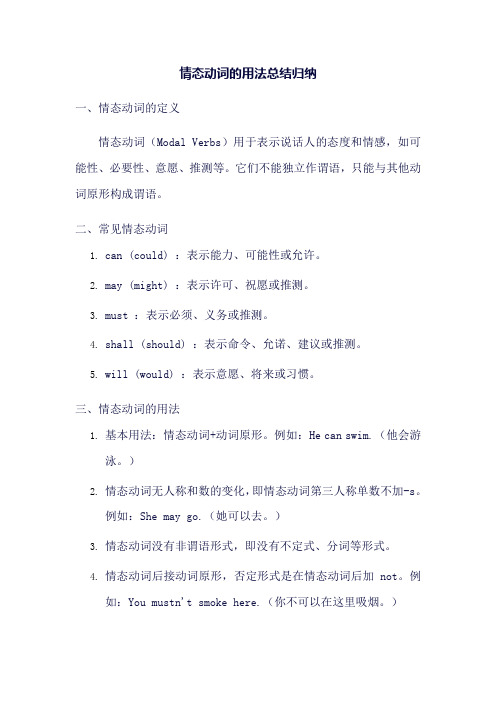
情态动词的用法总结归纳一、情态动词的定义情态动词(Modal Verbs)用于表示说话人的态度和情感,如可能性、必要性、意愿、推测等。
它们不能独立作谓语,只能与其他动词原形构成谓语。
二、常见情态动词1.can (could) :表示能力、可能性或允许。
2.may (might) :表示许可、祝愿或推测。
3.must :表示必须、义务或推测。
4.shall (should) :表示命令、允诺、建议或推测。
5.will (would) :表示意愿、将来或习惯。
三、情态动词的用法1.基本用法:情态动词+动词原形。
例如:He can swim.(他会游泳。
)2.情态动词无人称和数的变化,即情态动词第三人称单数不加-s。
例如:She may go.(她可以去。
)3.情态动词没有非谓语形式,即没有不定式、分词等形式。
4.情态动词后接动词原形,否定形式是在情态动词后加not。
例如:You mustn't smoke here.(你不可以在这里吸烟。
)5.带有情态动词的疑问句和否定句变换只需将情态动词提到主语前或直接在情态动词后加not。
例如:Can he dance?(他会跳舞吗?)He can't dance.(他不会跳舞。
)6.情态动词可以表示推测和可能性。
例如:It may rain tomorrow.(明天可能会下雨。
)7.情态动词可以表示命令和建议。
例如:You should study hard.(你应该努力学习。
)8.情态动词可以表示习惯和规律。
例如:He will arrive at nine.(他将在九点到达。
)9.情态动词可以与完成时连用,表示对过去的推测和猜测。
例如:She may have gone to the cinema.(她可能去看电影了。
)10.情态动词可以与进行时连用,表示对现在的推测和猜测。
例如:He must be studying in the classroom.(他一定在教室里学习。
情态动词用法归纳(全)
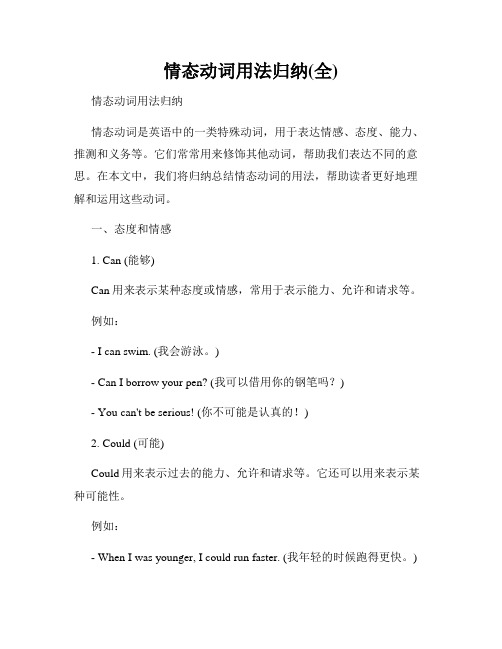
情态动词用法归纳(全)情态动词用法归纳情态动词是英语中的一类特殊动词,用于表达情感、态度、能力、推测和义务等。
它们常常用来修饰其他动词,帮助我们表达不同的意思。
在本文中,我们将归纳总结情态动词的用法,帮助读者更好地理解和运用这些动词。
一、态度和情感1. Can (能够)Can用来表示某种态度或情感,常用于表示能力、允许和请求等。
例如:- I can swim. (我会游泳。
)- Can I borrow your pen? (我可以借用你的钢笔吗?)- You can't be serious! (你不可能是认真的!)2. Could (可能)Could用来表示过去的能力、允许和请求等。
它还可以用来表示某种可能性。
例如:- When I was younger, I could run faster. (我年轻的时候跑得更快。
)- Could I ask you a question? (我可以问你一个问题吗?)- It could rain later, so bring an umbrella. (今天后面可能会下雨,所以带上雨伞。
)3. May (可能)May常表示许可、请求和推测等。
它还可以用来表示某种可能性或希望。
例如:- May I use your phone? (我可以用一下你的手机吗?)- It may rain tomorrow. (明天可能会下雨。
)- They may arrive late. (他们可能会迟到。
)4. Might (可能)Might与may的用法类似,但表示的可能性稍微低一些。
例如:- She might be busy. (她可能很忙。
)- I might go to the party, but I'm not sure yet. (我可能会去参加派对,但我还不确定。
)二、能力和推测1. Must (必须)Must用来表示强烈的推断或必要性。
高中英语知识点归纳情态动词的用法与义项
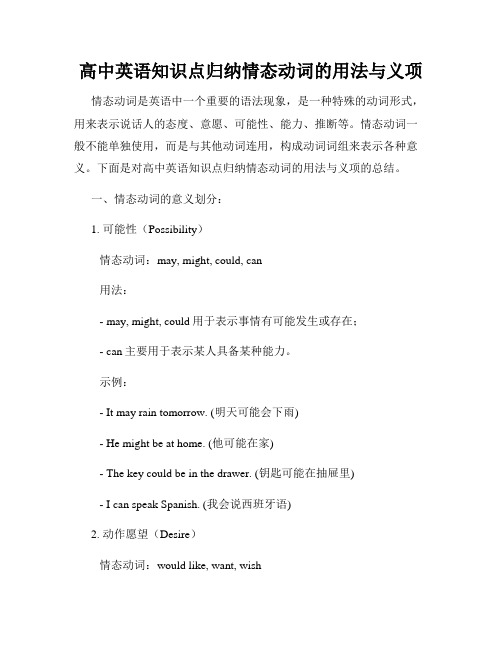
高中英语知识点归纳情态动词的用法与义项情态动词是英语中一个重要的语法现象,是一种特殊的动词形式,用来表示说话人的态度、意愿、可能性、能力、推断等。
情态动词一般不能单独使用,而是与其他动词连用,构成动词词组来表示各种意义。
下面是对高中英语知识点归纳情态动词的用法与义项的总结。
一、情态动词的意义划分:1. 可能性(Possibility)情态动词:may, might, could, can用法:- may, might, could用于表示事情有可能发生或存在;- can主要用于表示某人具备某种能力。
示例:- It may rain tomorrow. (明天可能会下雨)- He might be at home. (他可能在家)- The key could be in the drawer. (钥匙可能在抽屉里)- I can speak Spanish. (我会说西班牙语)2. 动作愿望(Desire)情态动词:would like, want, wish用法:- would like用于表示客气地提出请求或愿望;- want用于表示强烈的需求或欲望;- wish用于表示遗憾或对现在情况的不满或希望。
示例:- I would like to have a cup of coffee. (我想来一杯咖啡)- She wants to go shopping. (她想去购物)- I wish I had more free time. (我希望我有更多的空闲时间) 3. 推测与推断(Speculation)情态动词:must, may, might用法:- must用于表示说话人根据某种依据做出肯定的推测; - may, might用于表示可能性的推测。
示例:- It must be raining outside. (外面肯定在下雨)- He may/might be busy right now. (他可能正忙)4. 动作能力(Ability)情态动词:can, could用法:- can表示某人具备某种能力;- could表示过去的能力或给予请求、许可的非正式方式。
情态动词的用法
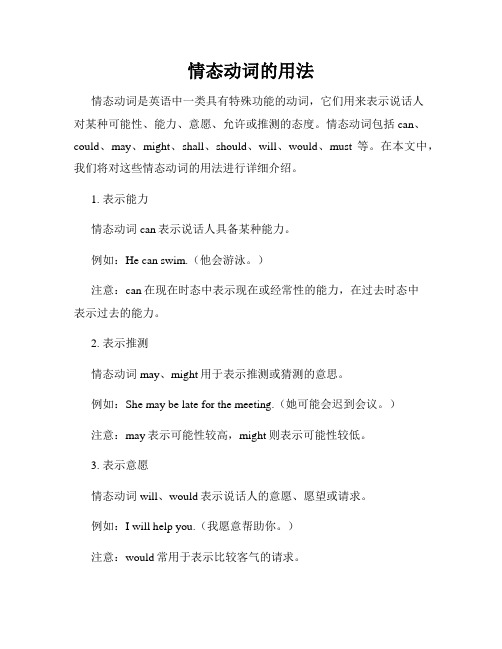
情态动词的用法情态动词是英语中一类具有特殊功能的动词,它们用来表示说话人对某种可能性、能力、意愿、允许或推测的态度。
情态动词包括can、could、may、might、shall、should、will、would、must等。
在本文中,我们将对这些情态动词的用法进行详细介绍。
1. 表示能力情态动词can表示说话人具备某种能力。
例如:He can swim.(他会游泳。
)注意:can在现在时态中表示现在或经常性的能力,在过去时态中表示过去的能力。
2. 表示推测情态动词may、might用于表示推测或猜测的意思。
例如:She may be late for the meeting.(她可能会迟到会议。
)注意:may表示可能性较高,might则表示可能性较低。
3. 表示意愿情态动词will、would表示说话人的意愿、愿望或请求。
例如:I will help you.(我愿意帮助你。
)注意:would常用于表示比较客气的请求。
4. 表示推测的过去情态动词must常用于表示对过去情况的推测或肯定。
例如:He must have missed the bus.(他肯定错过了公交车。
)注意:must用于表示对过去情况的肯定,而might用于表示对过去情况的推测。
5. 表示义务或必要性情态动词must表示对义务、必要性或确定性的肯定。
例如:You must finish your homework.(你必须完成作业。
)6. 表示建议或应该情态动词should表示建议或应该。
例如:You should go to bed early.(你应该早点睡觉。
)注意:should还可以表示对过去情况的推测,例如:He should have arrived by now.(他现在应该已经到达了。
)7. 表示允许或许可情态动词can与may可以用于表示许可或允许。
例如:Can I borrow your pen?(我可以借你的钢笔吗?)8. 表示可能性情态动词could用于表示可能性。
情态动词的用法总结及例句解析
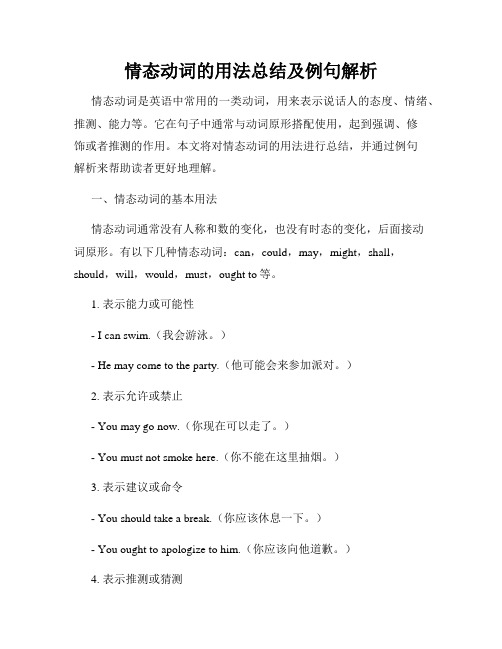
情态动词的用法总结及例句解析情态动词是英语中常用的一类动词,用来表示说话人的态度、情绪、推测、能力等。
它在句子中通常与动词原形搭配使用,起到强调、修饰或者推测的作用。
本文将对情态动词的用法进行总结,并通过例句解析来帮助读者更好地理解。
一、情态动词的基本用法情态动词通常没有人称和数的变化,也没有时态的变化,后面接动词原形。
有以下几种情态动词:can,could,may,might,shall,should,will,would,must,ought to等。
1. 表示能力或可能性- I can swim.(我会游泳。
)- He may come to the party.(他可能会来参加派对。
)2. 表示允许或禁止- You may go now.(你现在可以走了。
)- You must not smoke here.(你不能在这里抽烟。
)3. 表示建议或命令- You should take a break.(你应该休息一下。
)- You ought to apologize to him.(你应该向他道歉。
)4. 表示推测或猜测- He could be there.(他可能在那里。
)- It might rain tomorrow.(明天可能会下雨。
)5. 表示义务或必须- We must finish the project on time.(我们必须按时完成这个项目。
)- You ought to help him.(你应该帮助他。
)二、情态动词的细分用法除了以上的基本用法外,情态动词还有一些特殊的用法,需要注意其具体含义和用法。
1. can 和 could- 表示能力和技能:I can play the piano.(我会弹钢琴。
)- 表示请求或许可:Can I use your computer?(我可以用你的电脑吗?)- could 还可以用来表示过去的能力或许可:When I was young, I could run very fast.(小时候,我跑得很快。
情态动词的用法总结
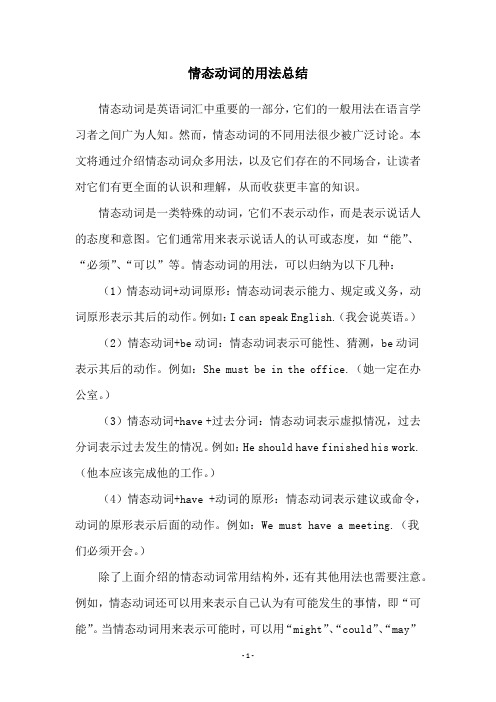
情态动词的用法总结情态动词是英语词汇中重要的一部分,它们的一般用法在语言学习者之间广为人知。
然而,情态动词的不同用法很少被广泛讨论。
本文将通过介绍情态动词众多用法,以及它们存在的不同场合,让读者对它们有更全面的认识和理解,从而收获更丰富的知识。
情态动词是一类特殊的动词,它们不表示动作,而是表示说话人的态度和意图。
它们通常用来表示说话人的认可或态度,如“能”、“必须”、“可以”等。
情态动词的用法,可以归纳为以下几种:(1)情态动词+动词原形:情态动词表示能力、规定或义务,动词原形表示其后的动作。
例如:I can speak English.(我会说英语。
)(2)情态动词+be动词:情态动词表示可能性、猜测,be动词表示其后的动作。
例如:She must be in the office.(她一定在办公室。
)(3)情态动词+have +过去分词:情态动词表示虚拟情况,过去分词表示过去发生的情况。
例如:He should have finished his work.(他本应该完成他的工作。
)(4)情态动词+have +动词的原形:情态动词表示建议或命令,动词的原形表示后面的动作。
例如:We must have a meeting.(我们必须开会。
)除了上面介绍的情态动词常用结构外,还有其他用法也需要注意。
例如,情态动词还可以用来表示自己认为有可能发生的事情,即“可能”。
当情态动词用来表示可能时,可以用“might”、“could”、“may”等表达。
例如:He might be able to help us.(他可能可以帮助我们。
)此外还可以使用“should”表示建议,它的否定形式“should not”可以表示禁止或劝阻。
例如:You should not go out after dark.(你晚上不应该出去。
)情态动词还可以用来表示让步,这时使用的情态动词一般是“could”或“would”。
高中英语情态动词的常用用法归纳(超详细)
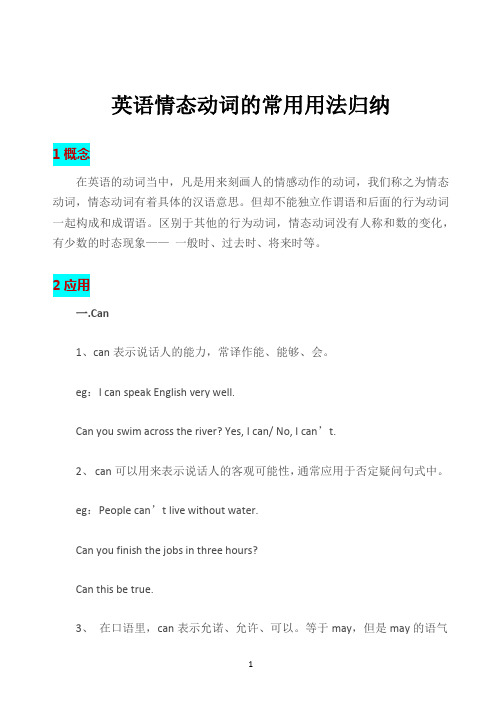
英语情态动词的常用用法归纳1概念在英语的动词当中,凡是用来刻画人的情感动作的动词,我们称之为情态动词,情态动词有着具体的汉语意思。
但却不能独立作谓语和后面的行为动词一起构成和成谓语。
区别于其他的行为动词,情态动词没有人称和数的变化,有少数的时态现象——一般时、过去时、将来时等。
2应用一.Can1、can表示说话人的能力,常译作能、能够、会。
eg:I can speak English very well.Can you swim across the river? Yes, I can/ No, I can’t.2、can可以用来表示说话人的客观可能性,通常应用于否定疑问句式中。
eg:People can’t live without water.Can you finish the jobs in three hours?Can this be true.3、在口语里,can表示允诺、允许、可以。
等于may,但是may的语气重于can。
eg:Can I come in? = May I come in?Can I use your bike? = May I use your bike ?*表示允许可以may mightcould can4、在“过去时”的语境里,通常用could 表示它的过去式,用be able to 短语(was/were)而could通常用来在一般现在时的语境里表示委婉语气eg:Could(can)you show me the way to the supermarket?5、can表示猜测(1)对现在状态的一种猜测,只能用在否定疑问句中。
eg:Zhang can’t be ill really?This can’t be done by him.(2)对现在动作的猜测eg: The boy can’t be telling lies.Mary works so hard, now, she can’t be sleeping.(3)对过去动作的一种猜测eg:He can’t have gone to the bookshop yesterday.Mother couldn’t have said it.6、can(could)惯用法(1)can’t wait to do 迫不及待做…….eg: Children can’t wait to eat apples in the basket.(2)can’t help doing 情不自禁做某事。
高中英语知识点归纳情态动词的用法和辨析

高中英语知识点归纳情态动词的用法和辨析情态动词是英语中的一类特殊动词,它们用来表示说话者对某种行为、能力、必要性等方面的态度或推测。
情态动词包括can, could, may, might, must, shall, should, will, would等。
它们在句子中有一定的用法和辨析。
一、can与could1. 表示能力与可能can用于一般现在时和一般未来时,表示肯定的能力或可能性;e.g. He can swim.(他会游泳。
)I can solve this problem.(我能解决这个问题。
)could则用于过去时,表示过去某一时间的能力或可能性。
e.g. When I was young, I could run very fast.(当我年轻的时候,我跑得很快。
)2. 请求与许可can用于一般现在时,表示请求或征询许可;e.g. Can I borrow your pen?(我可以借用你的笔吗?)Could则更加委婉,用于礼貌地请求或征询许可。
e.g. Could you please help me with the homework?(你能帮我做作业吗?)二、may与mightmay用于一般现在时和一般未来时,表示较正式的许可或征求对方意见。
e.g. May I use your phone?(我可以用你的电话吗?)might则表示过去或将来的一种可能性,常用于虚拟语气中。
e.g. If it rains tomorrow, we might stay at home.(如果明天下雨,我们可能会呆在家里。
)三、must1. 表示推测或推理must用于一般现在时和一般过去时,表示根据已有的客观事实或推理得出的合理推测。
e.g. He has been studying hard, so he must pass the exam.(他一直在努力学习,所以他一定会通过考试。
)2. 表示义务或必要性must用于一般现在时和一般过去时,表示说话者的主观认识或认为事物具有必然性或必要性。
情态动词的用法总结

情态动词的用法总结情态动词是一类特殊的动词,用来表示说话人对其中一种行为、状态或可能性的态度、判断、推测、愿望等情态。
情态动词有can,could,may,might,will,shall,should,would,must等。
它们在语法上有一些特殊的用法和用法限制。
以下是情态动词的用法总结:1.表示能力和许可:- Can/could:用来表示能力,做事的方式上拥有能力或技能。
例如:I can swim.(我会游泳。
)- May/might:用来表示允许或许可。
例如:May I go to the bathroom?(我可以去洗手间吗?)- Will/would:用来表示请求或许可。
例如:Would you please close the door?(你能关门吗?)2.表示推测和可能性:- May/might:用来表示推测、猜测或可能性。
例如:He may be at home.(他可能在家。
)- Could:用来表示一种可能性或假设的情况。
例如:He could bein the park.(他可能在公园。
)3.表示义务和必要性:- Must:用来表示义务、必要性或推测。
例如:You must finish your homework.(你必须完成作业。
)- Should:用来表示建议、责任或推测。
例如:You should apologize for your behavior.(你应该为你的行为道歉。
)4.表示愿望和偏好:- Would:用来表示过去或不太可能实现的愿望或偏好。
例如:I would love to go on vacation.(我很想去度假。
)需注意的是,情态动词具有一些特殊的用法和词语组合,例如情态动词后接动词原形、后接动词不定式的完成式形式等。
使用情态动词时需要根据具体语境和句子结构进行合理搭配与运用。
- 1、下载文档前请自行甄别文档内容的完整性,平台不提供额外的编辑、内容补充、找答案等附加服务。
- 2、"仅部分预览"的文档,不可在线预览部分如存在完整性等问题,可反馈申请退款(可完整预览的文档不适用该条件!)。
- 3、如文档侵犯您的权益,请联系客服反馈,我们会尽快为您处理(人工客服工作时间:9:00-18:30)。
英语情态动词的常用用法归纳1概念在英语的动词当中,凡是用来刻画人的情感动作的动词,我们称之为情态动词,情态动词有着具体的汉语意思。
但却不能独立作谓语和后面的行为动词一起构成和成谓语。
区别于其他的行为动词,情态动词没有人称和数的变化,有少数的时态现象——一般时、过去时、将来时等。
2应用一.Can1、can表示说话人的能力,常译作能、能够、会。
eg:I can speak English very well.Can you swim across the river? Yes, I can/ No, I can’t.2、can可以用来表示说话人的客观可能性,通常应用于否定疑问句式中。
eg:People can’t live without water.Can you finish the jobs in three hours?Can this be true.3、在口语里,can表示允诺、允许、可以。
等于may,但是may的语气重于can。
eg:Can I come in? = May I come in?Can I use your bike? = May I use your bike ?*表示允许可以may mightcould can4、在“过去时”的语境里,通常用could 表示它的过去式,用be able to 短语(was/were)而could通常用来在一般现在时的语境里表示委婉语气eg:Could(can)you show me the way to the supermarket?5、can表示猜测(1)对现在状态的一种猜测,只能用在否定疑问句中。
eg:Zhang can’t be ill really?This can’t be done by him.(2)对现在动作的猜测eg: The boy can’t be telling lies.Mary works so hard, now, she can’t be sleeping.(3)对过去动作的一种猜测eg:He can’t have gone to the bookshop yesterday.Mother couldn’t have said it.6、can(could)惯用法(1)can’t wait to do 迫不及待做…….eg: Children can’t wait to eat apples in the basket.(2)can’t help doing 情不自禁做某事。
eg:When I heard the news I can’t help laughing.(3)can’t but do 不得不eg:I can’t but refuse you.We can’t but ask him about it.*can’t but do 区别于have tohave to 表示说话人在客观条件下的无奈所为,表示说话人的一种无奈情绪。
can’t but do强烈突出说话人内心的反抗反对情绪。
二.May1、may表示可能性,也许、可能,通常应用于正式文体eg:China may make friends with many people all the world.Boss said that you might drive this new car.You may not take this book out of the reading room.2、may表示允许、允诺,口语中等于can, may比can语气强。
eg:May I speak here?May I go in to the room to see her? Yes, you may. No, you mustn’t. *may 表示允诺、允许,其问句回答的排序eg:May I use your pen?Yes, you sure please. ok…..No, you mustn’tyou had better notplease don’tyou can’tI don’t think you canyou may not3、might在表示上述概念时,语气更委婉eg:She was afraid that they might not her idea.He asked if he might look through your album.4、may 表示推测,通常用于肯定句中(1)对现在状态的一种推测。
eg:He may be very busy now.(2)对现在动作的一种推测。
eg:Where is Tom? He may(might) be having breakfast at this moment. (3)对过去动作的一种推测。
eg:Where were you last night?I might have watched TV or have read the novel at home.5、may的固定用法(1)may在祈使句中至于句首表示祝愿。
eg:May you succeed!May god be with you.May you live to be one hundred.(2)may在状语从句当中构成特殊的状语结构。
eg:They wanted to go to the Chinese restaurant they might eat the soup.(3)may/might as well + 动词原形表示还是….eg:You may as well post him the letter again.It was snowing I might as well stay at home.三.must / have to1、must表示必须、一定、一定要,是所有情态动词当中语气最强的,突出表现说话人的一种指责,即说话人主观上应该………eg:Everybody must obey the rules.People must do everything step by step.Must we hand in our working plan this week?Yes, you must. No, you needn’t /you don’t have to.have to 必须、不得不、表示说话人客观条件下必须要做的事情,烘托说话人的无奈情绪。
eg:I had to answer the same question three times in class.I hope you will have to finish your schooling this year.2、must表示推测,但通常应用于肯定句式。
(1)对现在动作的一种推测must be doingeg:You haven’t warm clothes, you must be feeling cold.(2)对现在状态的一种推测。
eg:ZhangHua must be in his room, because he telephoned me five minutes ago.(3)对过去动作的一种推测must have doneeg:The road is white, it must have rained last night.You must have caught the first train, if you have got up early.四.need1、need是特殊的行为动词,具有双重性,即情态动词和行为动词两种形式,通常肯定句式用行为动词形式need to do,否定和疑问用情态动词形式。
eg:You need to go there by yourself.He needs to read it for many times.We needn’t worry about him.Heed I finish my job today?Need I come here tomorrow? Yes, you need / Yes, you need / Yes you shouldYes, you may.Yes, you must.正确排序:Yes, you must / Yes, you have to / Yes, you ought to / Yes, you should / Yes,you need.2、need的特殊用法,可以表示责备。
need have done 需要做而没有做的事。
needn’t have done 没有必要做反而做了的事。
eg:You need have done it three days before.The train is close to us, you needn’t have hurried their early.3、need的固定用法need doing = need to be done 表示被动意义eg:This young tree needs watering.五.dare1、dare与need一样,具有行为动词,情态动词双重性,肯定句为行为动词,否定疑问句为情态动词。
eg:Mary dares to go there alone.Dare you go through the forest at night? Yes, I dare.She dare not stay at home alone.No one dared speak of it again.2、dare的惯用法I dare say 我敢说。
eg:If your father dies, who will get the money? I dare say my uncle will.六.ought to / should1、ought to指说话人在道义和义务上应尽的责任和义务,使用ought to具有一定针对性,通常是按理推断。
should表示应该,只是强调单从人说话的角度上看指劝告、建议,语气比ought to 弱。
eg:You are her mother; you ought to look after her well.The youth ought to defend our mother land.You ought to take your parents’suggestion (advice).Ought I to obey the rule in your class?Yes, you ought to / No, you oughtn’tOughtn’t we to do everything possible to stop pollution?We should study foreign language very hard.One should be selfish.We should encourage the newer, for we are his classmates.2、should在虚拟语气当中可以构成特殊的谓语结构eg:I suggested that he (should) be sent to the hospital at once. should 在虚拟语气中放在疑问,否定句中表示惊讶eg:I shouldn’t worry if I were you.Why should she do that?3、ought to, should 表示责备Ought to (should) + be doingOughtn’t to (should) + be doing 指说话人对现在动作的一种责备。
